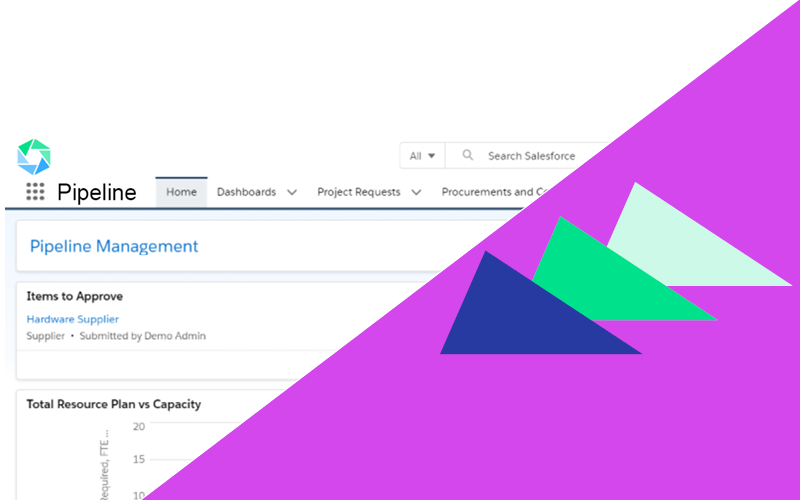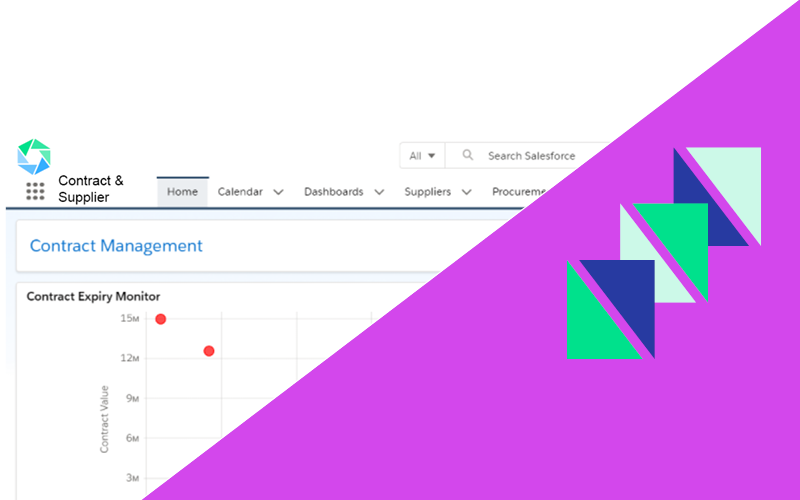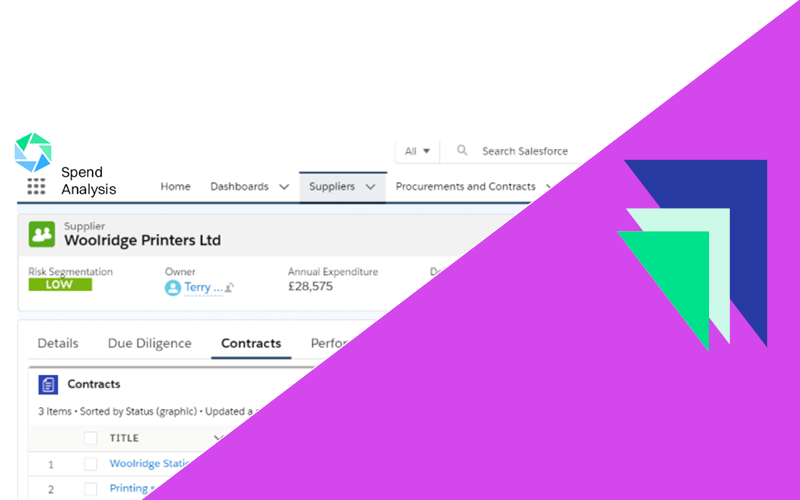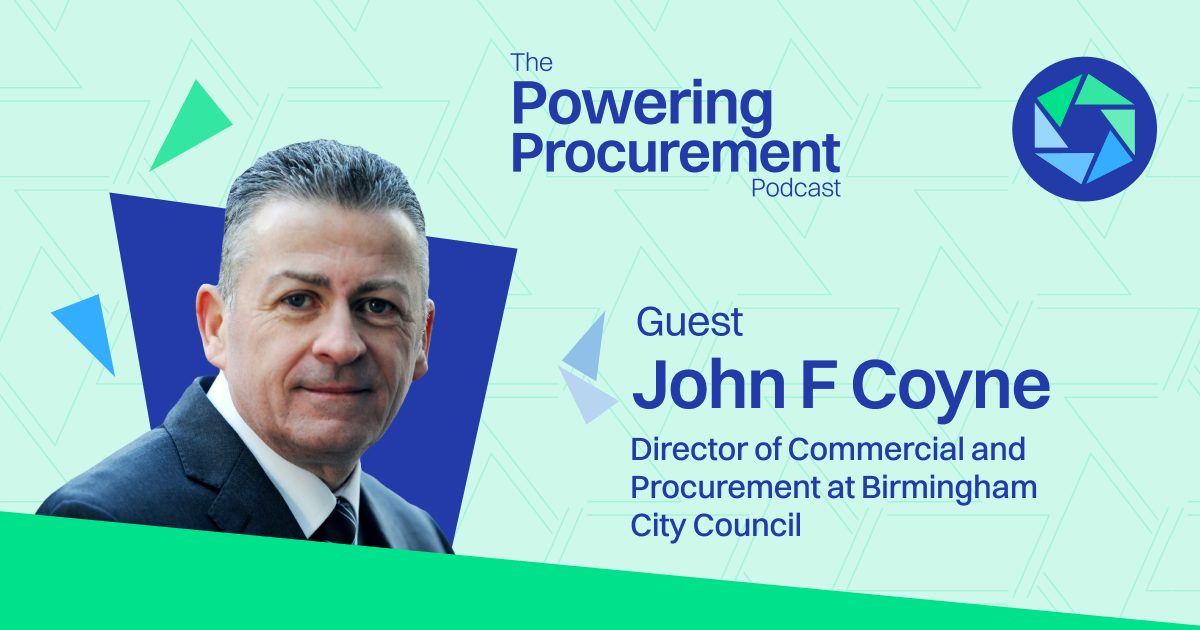“If we’re really gonna change communities, if we’re gonna improve those communities, we have to be working with, listening to, and talking constantly with the people in those communities.”
In this episode of Powering Procurement, hosts Sian Lloyd and Gareth Burch are joined by John Coyne, Director of Commercial and Procurement at Birmingham City Council. Together, they dive into John’s decades-long career, the power of procurement in driving social and economic impact, his vision for Birmingham’s future, and why AI and data are the next frontiers for public sector procurement.
John’s career in commercial and procurement spans over three decades across diverse sectors. He began his career in the UK working in Irish tourism for 12 years before becoming the first Commercial Director at Liverpool Football Club. For the past 15-18 years, he has focused on public sector procurement, most recently serving in a senior procurement role with the Welsh government before taking his current position at Birmingham City Council in late 2023, John is responsible for transforming Birmingham Council’s procurement function following the authority’s bankruptcy declaration.
If you enjoyed this episode, make sure to subscribe, rate and review on Apple Podcasts and Spotify; instructions on how to do this are here.
Find on Spotify
Find on Apple Podcasts
Watch on YouTube
Are you looking for procurement software designed with you in mind?
Speak to our team today about transforming your procurement function.
Get a Demo
Read Full Episode Transcript
Read Full Episode Transcript
[00:00:00] Sian Lloyd: The Powering Procurement podcast is brought to you by Atamis, sourced to contract software designed to save you time and money. Hello, and welcome to Powering Procurement, a podcast by Atamis, where we unpack the world of procurement and supply chain management with the help of industry leaders. I’m your host, Char Lloyd, and this is our resident expert, Gareth Burch.
[00:00:24] Gareth Burch: Hi. After 20 years in procurement, I may be billed as an expert, but believe me, I’m here to learn too.
[00:00:31] Sian Lloyd: Each episode together with our expert guests, we’ll dive into specific challenges and opportunities facing the procurement industry today.
[00:00:40] Gareth Burch: And we’ll explore easy wins and longer term strategies to help you rise to the challenge of driving value through your work while showcasing the power of procurement.
[00:00:50] Sian Lloyd: So let’s get going. Welcome to Powering Procurement. Today, we are absolutely thrilled to be joined by John Coyne, who now leads the procurement function at Birmingham City Council, one of the largest local authorities in Europe. John’s career in procurement and commercial strategy spans more than 3 decades across sectors as varied as health care, government, and even as the 1st commercial director of Liverpool Football Club. His expertise in building high performing procurement functions and driving transformation are second to none.
[00:01:27] Gareth Burch: John’s work in procurement isn’t just about streamline processes. It’s about creating real, lasting value for community. At Birmingham council, he’s guiding the procurement strategy to be both resilient and responsive, whilst keeping an eye on the opportunities in the upcoming procurement act. Today, we’ll explore his vision for Birmingham’s future, the changes he’s prioritizing, and the longer term impact. Welcome, John.
[00:01:58] John Coyne: Thank you, Harris.
[00:02:00] Sian Lloyd: Yeah. It’s great to have you with us, John. And we’re really looking forward to hearing about your vision going forward and and the new role there. But I suppose to begin the podcast, um, we’d love to learn a little bit more about you. Uh, it’s a question we often ask our guests as the first question, which is just to share a bit about your journey with us into procurement. You know, what drove you into it, and what keeps you motivated as well?
[00:02:24] John Coyne: I think, really, um, I’d have to be honest and say default in one sense of procurement. I’m very much a commercial individual, and, of course, procurement as an art sits very much within a commercial life cycle. So I’ve a lot of experience. You’ve mentioned some of that going way back. I started my career in the UK coming over to work in Irish tourism and spent 12 years doing that. Um, and then from there, I I took an opportunity to go into Liverpool Football Club as their 1st commercial director. But the common golden thread runs through my career is commerciality, really, and how we use money, uh, spend particularly, um, to actually, uh, leverage out, uh, greater returns for, uh, in the case of, um, sport and tourism, you know, ultimately, for the private sector organizations that you’re charged to deliver for. Um, later in my career, the last 15, 18 years, I’ve worked very much within public government settings. Uh, and then it’s all about using the public purse, really, to be able to deliver for, um, communities that you’re working within, and, um, ensuring that you’re really, uh, fulfilling your social obligations, particularly. Because ultimately, we are here to deliver. In this case now, uh, I find myself in Birmingham. Um, and it is, for me, my local, uh, main principal city. Uh, I live about 25 miles outside Birmingham in a district called Stowbridge, um, but very familiar, obviously, as well, uh, with Wales, because I’m only 8 weeks in my job here in Birmingham, um, and have come here, um, sadly, to leave, uh, after holding a very similar post in the Welsh government. Um, and clearly looking to take a huge amount of learning, uh, that Wales is leading on, uh, to ensure that we can utilize both procurement and other commercial levers, uh, to deliver for the people at Birmingham.
[00:04:20] Gareth Burch: Personally, I’d like to focus on Liverpool. But, unfortunately, it’s the Power and Pretend podcast. Um, now you’re in your role in Birmingham Council, what are some of the key challenges and opportunities you see in shaping procurement?
[00:04:37] John Coyne: Okay. Well, let’s, um, have to start with the, sort of, uh, a bit of a a brief explanation because, um, I’m sure many of your listeners will be aware of Birmingham, uh, doesn’t, um, at the moment, I suppose, ring out as opposed to an endorsement of how to do things. Uh, we’re a largest local authority in Europe, and sadly, um, were bankrupt. Uh, and that’s a very, uh, well publicized situation it finds itself in, uh, for a number of, uh, you know, strategic reasons. Um, but I think fundamentally, because maybe, uh, as a local authority, we’ve lost sight of, um, in the past, what was our sole responsibility and function, um, and really become maybe much more focused on sort of high level, um, spending, uh, as opposed to actually getting into the grassroots, which local authorities need to refocus and, um, drive really the agenda around how we can do things much better for our local communities by using some of our tools in the box. And one of the big tools that I’m very keen to use is over a £1,000,000,000 worth of annual spend, um, into the Birmingham, uh, city region. Uh, and that’s also, you know, surrounding local authorities here. Uh, the West Midlands Conurbation is fairly, uh, unique in the sense of there’s 8 to 9, uh, quite large local authorities that neighbor each other, Birmingham being principally the largest. But so so setting the context in the scene, um, my first 8 weeks here has been really understanding about where Birmingham City Council is, and where we need to go. Um, I’m really part of that journey is not gonna be fast, uh, because we’ve got a change in approach and a culture here. And then we’ve got to look to embed long term levers, um, which actually can ensure that we’re utilizing our spend efficiently, uh, creating value for money. But above all, creating, you know, returns for the people who live and work and reside in Birmingham.
[00:06:35] Sian Lloyd: That’s really interesting, John. And I think it feels really timely for us. As you say, you’re 8 weeks into the role to actually be speaking to you now about this. And we feel that, you know, we’re gonna get, uh, quite a unique perspective, and certainly your insight, uh, as you’re looking ahead now, um, for the future. And the job that you’ve got in hand, really, and it’s a new role, isn’t it, that you’re undertaking at the moment, director of procurement and commercial. Is that because of the task that you’re faced with? Was that the reason for creating the new role?
[00:07:12] John Coyne: Yeah. Absolutely. Um, for those again listening who may not be overly familiar, um, when local authorities get themselves into difficulty, um, and in the case of Birmingham, you know, ultimately declare bankruptcy, uh, central government have to come to the rescue in effect. Uh, because clearly, we can’t be allowed to go how, uh, private sector organizations would go, uh, or when they reach back in groupsy. Um, we have to provide services, crucial services in some cases, to our people and citizens. So the government steps in, and they put in place, in Birmingham’s case, um, a range of commissioners who specialize in different areas. And particularly the commissioner that I am responsible, uh, to, as well as the elected members here and senior officers, um, actually determined that one of our challenges or one of the challenges of the local authority was the lack of commercial focus, uh, and commercial vision. Um, and that translated across a whole host of areas. Procurement, absolutely for sure. But, you know, procurement is a part of the process in one sense. It’s procuring things. But actually, we have good contract management, which is a, you know, often, uh, a neighbor of procurement, uh, procurement doesn’t work. Um, and then really without an overarching commercial life cycle strategy around what we’re looking to really deliver through our spend. Um, and it’s not just about value for money. It’s not anymore about low low cost or low price. It’s around how we can spend our pound well. Um, and well means can I create employment, can I create better community, uh, services, can I create better health and and social care, uh, background, and and the contribution into those communities? Um, as well as clearly being efficient, uh, contributing to net zero, decarbonization that now the world is very much focused on is coming to the back end of COP COP, uh, 29, I think. Um, so that’s something that we’ve been missing here is how we close the loop, um, around ensuring that the whole commercial life cycle, uh, including the critical element of procurement, is is really, uh, very sharp and very focused on what our responsibilities and our strategic goals are.
[00:09:38] Gareth Burch: And, obviously, you’ve only been there a mere 8 weeks. But how have you found that transition in 8 weeks? Because what you’ve outlined there is such a difficult task for most senior professionals anyway. But I can’t imagine doing it in a in a business which ultimately is bankrupt.
[00:10:03] John Coyne: Yeah. Well, I suppose it’s it’s sort of, again, uh, personally, I’m hugely confident. Um, we have great people who work here. Maybe, you know, uh, the direction and, uh, the the the depth of leadership has not been there to support them. Um, some of our approaches are not really, uh, complimentary in relation to a lot of our procurement activity, for example, has been very siloed. Um, and that’s not, uh, appropriate for us really to utilize our combined spend to deliver. Uh, so for example, you know, such a large local authority, at the moment, we’re buying our stationery from a whole host of different supplies. We’re not gonna get scale or or or volume benefit from doing that. We need a what’s often referred to in procurement terms as a framework, whereby we have a single supplier, um, and everyone buys at, uh, you know, from a single supplier have pre, negotiated procurement rates. Um, and that way, we start to then, uh, both improve service, improve efficiency, and improve value for money. And by doing that, we should be circular economy, um, you know, which is very much, um, a steal from the Welsh government. Um, how how we start to create a circular economy here. So, you know, ultimately, our spend should always be being recycled throughout Birmingham, uh, be it benefits for its citizens, or be it benefits because we can do a lot more with our limited budget spend.
[00:11:37] Sian Lloyd: I was really interested to hear you at the beginning, John, talk about, uh, wanting to take some of the lessons that you’d learned in Wales with you to Birmingham. Um, so it’d be great to hear a little bit more about that. And also, I think something, Gareth, that we’ve been talking quite a lot on the podcast series about, of course, the new procurement act, and and whether you see, you know, elements of that that you’re going to be able to to use to your benefit, um, perhaps making you more agile and assisting with the the situation that Birmingham’s now in.
[00:12:10] John Coyne: Yeah. Yeah. Very much, Joanna. I think they’re complimentary. And I know from my time, uh, leading procurement in in Wales, uh, you have your own specific, um, legislation there as well, which some of which social, um, the social, um, partnership act, uh, and then also piggybacking on the procurement act. Procurement act is recognizing that maybe in the past, there’s been too much focus on value. Um, so what you know, to me, a key critical change is this acronym that which is often referred to as meat, most economical advantageous tender, is now changing to maths, most advantageous tender. And once you start to do that, it’s a big, it is really a big sort of, um, mind shift. Because all of a sudden, we’re not necessarily talking about cheapest price or best price. We’re talking about, you know, ultimately a price that delivers. Um, and that can be delivering value, book can be delivering benefits, can be creating employment. You know, all of those things very much which are enshrined in the Future Generation Act in in Wales. So absolutely, I’m really, uh, focused on how we take the best and bring some of that to Birmingham, um, because ultimately, the net beneficiaries will be the people of Birmingham, who are the people that we’re here to serve. So certainly, going back to procurement act, there’s some great changes, uh, being, uh, enshrined within the new legislation. Um, clearly, uh, delayed slightly, and there’s now the work of a national procurement, uh, statement being undertaken by the UK government, which again slightly deviate because Wales is fortunate that they’ve had their own national, uh, procurement statement. But we would be aligned to the UK government, and we’ve been very much involved in the consultation process that has come about as a result of the desire of the current, uh, government now to ensure that we’re embedding a new national procurement statement. And and some of that is gonna be clearly, I would think, linked into the mission driven objectives of the current government. Um, and that is a positive as well because equally, not too dissimilar to a national government, local authorities have to be very focused on mission driven. Um, and, you know, what we need to deliver the best for our people and our communities, which will be very different maybe from, um, affluent local authorities. We have some of the highest deprived, uh, rates, um, in in in the UK, and if not in Europe. We have some pockets of our communities here with the highest unemployment in the UK. Um, but still, we’re a hugely outward looking city with a second city. Um, we have a lot, you know, progressively happening here. HS 2, um, sort of terminal, uh, really being in the heart of the city here. So the future is looking certainly extremely bright. What I am not, uh, naive about is how long and how hard that would journey be. So if you talk of practicalities, Ivan Harris is a procurement function here, which needs a lot of help, needs a lot of rebuilding, and needs really to be fit for purpose for the next 20 years. Um, we need then to bring into that, uh, you know, all the other, um, elements of commerciality. Um, again, we can have the finest procurement, uh, operation in the world. But if we don’t have a similar fine, uh, contract management, uh, function, uh, we’re in real risk that the best procurement, uh, in the world won’t deliver the results because we have to ensure that suppliers and supply chain are fully engaged with us, and they’re with us on this journey of change that we’re trying to develop. Um, and one of the easiest ways for procurement people to improve, uh, on letting of contracts when they come up for renewal is to listen and to build in really critical and vital feedback from suppliers. Suppliers know how to supply. Uh, often sometimes, uh, we’ve just lost track of, you know, um, listening as opposed to maybe talking at the supply chain. Uh, and that’s something that we are very conscious of embedding here. Uh, a long way to go because we haven’t really engaged with our supply chain here in the Midlands. Um, and we need to be doing that. We need to be identifying how we can help small, medium enterprises, social partnerships, um, and other social organizations have a fair crack of the whip. Uh, so that’s certainly a plan very much of how we build a particular unit to engage with our supply chain here. And then lastly, the commercial life cycle, uh, because, again, uh, it’s not purely procurement will deliver the benefits. Um, in, uh, Birmingham, because of the size and scale of the local authority, we have 60 arms length bodies. These can be, uh, trading companies that the local authority has established. It can be arms length bodies. Uh, it can be a form of tech company. But all of these organizations are primarily owned and operated, um, by Birmingham City Council. Um, many of them, as I say, arms length from the council. But we have to be clear that one of the strategic approach we’re adopting, that all of these other organizations are similarly adopting those same approaches. Because otherwise, we end up in a position whereby we could be delivering and contributing really well to their net zero goals. Uh, but then we discover a wholly owned arms length organization is actually not embedding net zero goals, um, and we’re undoing the good work we’re doing. So it is very much having a common vision around how commerciality can help us, uh, to deliver against all of those, uh, future, um, well-being impacts, uh, that are gonna be critical to us and our people, uh, and future generations. I mean, that’s one of the, I think, absolute spot on things that Wales has. They have that focus of the Future Generation Act, because it’s not necessarily about today. It’s about today, tomorrow, and, you know, 25 years’ time.
[00:18:16] Gareth Burch: Picking up on one of the points you mentioned, uh, just then, John, uh, around, uh, having that operational team, but then supported by, uh, almost technology. How do you feel AI and data analytics, um, or sorry, what do you feel the part of AI and data analytics will play in helping your team? But, also, what potential challenges do you anticipate?
[00:18:50] John Coyne: Okay. Well well, firstly, I think, again, uh, the critical the critical, uh, developments for the future. I think, um, particularly in the public sector, procurement as a profession has been slow to embrace digital technology. Um, and artificial intelligence, particularly, I don’t believe holds the fears that some people, uh, do, um, in relation to actually we should be utilizing artificial artificial intelligence to do the basics. Um, where at the moment, we’ve got very valuable highly skilled individuals doing that. Um, what artificial intelligence won’t replace is, not yet anyway, and hopefully for not a long run time, uh, the thinking, the creative strategic thinking. You know, anybody and this is where people do, have to be careful. Uh, anyone receiving sort of, uh, applications from candidates seeking new employment, um, don’t be using artificial intelligence. Because whilst that can set out the application, it can also make you look at completely Egypt, as we say in Ireland. Because actually, it doesn’t have the ability to creatively, uh, plan a letter or plan an application, um, and therefore, uh, it makes considerable mistakes. It can do the basics, where you have, you know, the same letter going out to a 1,000 council taxpayers, for example. That’s where AI can really deliver. But it can’t deliver around how we utilize and how we really put our shoulder into leveraging, uh, you know, all of the, uh, key well-being impacts that we need to leverage out to our procurement. It has no understanding around that. So it’s really embracing, uh, technology for what it’s really able to do at this time, uh, and utilizing that and embracing it, and freeing up bandwidth to get them to then spend and redeploy people into areas that artificial intelligence won’t succeed. Very similar data. We don’t we don’t really, uh, utilize my view, uh, sufficiently enough. The data that’s at our grasp. Um, we don’t report against this sufficiently. And that’s something, again, we have to get better, much better. Uh, Birmingham, we have a a long way to go there. I need to be in a position, and I want to be in a position, where in 3, 4 years time, we’re able to produce annual reports that showing our spend, showing how that spend is delivering, and influencing all of those well-being impacts, you know, where we can actually track back to whether a particular contract raised employment, where does it create employment, and who benefited from the contract letting. Um, and and as I say, we have a long way to go with that because and we were, well, duty bound, reverting back to the procurement act. We need to be, uh, getting a lot more smarter around how we uh, develop procurement pipelines because there’s gonna be an obligation on us to publish those. Um, and also our contracts register, we need to get a lot better on how we do the fundamentals because, you know, that drives our future. Uh, because looking back is the learning. We need to embrace and take forward that learning to improve year on year, contracts on contracts, procurement on procurement. Um, and particularly, data is critical there. Without the right data, it drives the majority of things even beyond the procurement world.
[00:22:15] Sian Lloyd: And actually data well, the phrase data is king is certainly something, Gareth, isn’t it? We’ve heard quite a lot during this podcast series. And, uh, we also know with AI, it’s only as good, isn’t it, as the data that it’s got access to. So, uh, really, really important discussion there, I think. Really want to pick up, John, on something you were talking about there, which was forward looking. And obviously, that is largely what your role is all about there at Birmingham City Council. So with that in mind, and I suppose drawing in what we’ve been looking at over the parent procurement podcasts about forward looking, it’s about sustainability. It’s about social value and the importance now of that in public procurement. So it’d be interesting to hear from you about how you’re embedding that now in the plans for Birmingham City Council going forward.
[00:23:08] John Coyne: Yeah. And and and that’s gonna be a fundamental, uh, building block that we need to firstly, uh, put in place. But then, you know, year on year, as we develop and as we fulfill our potential, we need to start to roll that out. So again, as you’d appreciate any major local authority, actually, um, our obligation is to help, uh, all loans, uh, that avail of the local authority. So we’re still very underdeveloped here about how we’re using our skills, our expertise, uh, to support, for example, colleagues in schools, and colleges across the Birmingham footprint, and how we’re also ensuring that we’re joining up with other public sector organizations like the NHS. Uh, so if you look very closely at some of our spends, you know, we’re clearly double spending because neighboring NHS trusts and, uh, community and primary care organizations will be spending in areas that we as a local authority that’s actually obliged to spend in. So we have to become a much more smarter, uh, approach to how we’re supporting other, uh, organizations. But because clearly, you know, if we’re able to deliver savings, uh, for education, that ultimately drops down to the bottom line of the local authority. Because 9 times out of 10, the majority of the funding they will receive will come via the local authority often through central government. Uh, so it’s really how we ensure that, you know, we get our own house in order and working well, and then we begin to, you know, blossom or or spread that out, uh, as through best practice. And again, we have a lot, you know, to look to, dare I say, Wales, um, you know, to to support us in that. Uh, the creation of the keyed center of excellence, uh, that is being accessed by many people in the pretty young man world in in Wales. And it’s something ultimately we need to be looking to mirror, um, because, again, we have such a huge, uh, volume and and spending power up here in the Midlands. Uh, so it’s working with neighboring local authorities. Uh, we have to really be coming together, uh, so that we’re both mirroring and complementing each other. We’re also we’re also investing in some of the, you know, infrastructure we heard about data, AI, um, and modern technology and digital offerings to actually, you know, really ensure that we’re working together as one voice, one profession.
[00:25:31] Gareth Burch: And do you feel that some of the new functionality being introduced through um, procurement reform, such as the central digital platform or the supplier information service, not possibly from February, but onwards, would help you deliver with deliver some of these activities?
[00:25:53] John Coyne: Yes. It will. Um, I think, you know, as you say quite rightly, and I think hope hopefully, our colleagues in cabinet office who are charged with the responsibility rolling out the act have always said that they’re recognized, you know, in these early days, because of some of the really fundamental shifts. Um, you know, it will be a an a a soft rollout, uh, because, you know, organizations such as our own here in Birmingham will still be left, you you know, wanting in relation to actually hitting the hitting the ground running. Um, should should we go live in February? Um, so so we will need to learn from what others are doing, um, and we need to certainly learn from some of the advances and some of the improvements such as, uh, central register. Um, also, similarly, you know, on being able to publish, um, and being very much more transparent around where our spend is going. We have to be marking our own homework, um, and we have to have others also marking our homework. Um, and we do that by putting her on public display. Uh, and that is certainly where, you know, some of the gain, some of the returns through the new procurement act will really start to deliver. But I I think this is, you know, absolutely long haul. Um, and I know certainly, you know, that’s the view taken by both central government, uh, and I think that’s why they were, uh, both, dare I say, brave enough to realize that they needed to maybe postpone, uh, the go live, uh, which was due in October to Q1 of, uh, 25 to make sure that everything was joined up. We don’t wanna be going at this twice. Uh, we wanna really get it right if we can the first time on the basic understanding that it’s gonna take, you know, 2 or 3 years to embed all of that in, and to actually have it working so that we realize the benefits that everybody is so keen to deliver against.
[00:27:50] Sian Lloyd: And John, um, actually, Lisa Stubbs, the head of open and transparent contracting at Cabinet Office, has been a guest on the podcast series. So it was really interesting to hear from her. Um, one of the key aspects of the new legislation is is opening up, isn’t it, public tenders to SMEs and, indeed, to social enterprises as well. I bear in mind what you were saying about the challenges that you have because of the legacy that that you’ve walked into there at Birmingham in terms of there hadn’t been that much connection with suppliers. But now you’re going to be looking to be reaching out to these SMEs and social enterprises as well. Um, how do you see them supporting Birmingham’s local economy? And I suppose the the opportunity perhaps that you do see there.
[00:28:39] John Coyne: Yep. The the the is that critical, ultimately, because, generally, I found my experience as social enterprises, SMEs, they’re they’re they’re absolutely, um, both embedded and enshrined within the local communities because they’re serving those local communities. So whilst the you know, clearly, there is a role and a function for huge global, uh, private sector organizations. Um, and they create tremendous employment up here in the Midlands region, uh, not least in Birmingham. You know, if we’re really gonna change communities, if we’re gonna improve those communities, the most challenged of those communities, we have to be working with, listening to, and talking, constantly with the people in those communities that know how they can make that difference and that change to those communities. And that really to me is absolutely, uh, where SMEs and social enterprises and yeah. You know, sort of, uh, dynamic, purchasing frameworks are critical. Because we need to ensure that we’re positively, um, you you know, engaging with those organizations. And that we are setting out to at least ensure that we can evidence where we have worked with those organizations, um, whilst not wishing to be, um, controversial by any means. Um, you know, if we are letting contracts, uh, way beyond, uh, the Birmingham, uh, footprint, Um, we have to question that that is money going out for our community. That is spend going out for our community. And whilst, you know, we are charged under, uh, the current regulations and the new regulations to ensure that we fulfill procurement. The new act gives us a lot of tools in our box, able to ensure that we can, you know, take all of those, uh, critical, uh, well-being impacts, still deliver economically, and still deliver often for the best price. But, actually, we can do that by embracing our own homegrown organizations, uh, who will automatically invest back into the community of of Bahrain.
[00:30:52] Gareth Burch: And picking up on that, um, so apologies. But maybe a bit of a direct question here. And large companies, enterprise companies such as Microsoft, um, etcetera, where you’re trying to keep that business within Birmingham, would that be looking to transact with local IT companies within Birmingham to support your business, opposed to the the larger enterprise UK companies?
[00:31:24] John Coyne: Yeah. Very much so. You may know one of the big drivers, um, one of the big ingredients for Birmingham being in the difficult financial position it’s in is, you know, through its, um, huge, um, IT program, which has gone badly wrong, and has led to huge overspend. Um, and I think there’s lessons to be learned to her in the sense of, you you know, um, there are many many IT solutions which already developed and off the shelf. Um, we don’t necessarily need to reinvent the wheel here. Um, and there’s a lot of, uh, correlation between the same and correlation of procurement. Some private private sector organizations are doing huge huge work around procurement and fulfilling their social responsibility, which they’re obliged to do under the company act legislation, and particularly in this country. And so we need to be looking at how public static can land from private, um, and also how hopefully we can embrace private sector, uh, much more in in partnership models. Um, but equally, it is the horses for courses. And we have a lot of, um, quite low or small activity that we’re undertaking here in Birmingham that actually doesn’t need, uh, the big high street names, such as a Microsoft or a, you know, Google or a big Wainton name. Um, you you know, some of those services can be delivered by more than competent, uh, homegrown, uh, industries here on our doorstep in Birmingham. Um, some of which are not actually many of those. You know, they’ve developed and grown over the last 20, 25 years to be punching waste, um, you know, with any of the national organizations that we can, uh, see on on on either our high street or, you you know, we see in the news daily. Um, so it’s it’s that combination. Um, but I think also we’re on a bound to ensure that wherever we can, we’re spending the money in a circular economy fashion. So rather than it being taken out, um, of, you know, potentially, certainly, the Birmingham, Midlands, UK, um, and and redistributed to, you know, in some cases, shareholders overseas. We’re looking at how we can proactively ensure that that money enters into a circular economy here in Birmingham.
[00:33:43] Sian Lloyd: So, John, you’re talking about keeping the pound local, aren’t you? And, um, I suppose another direct question, if you like, from me, which is, how bold are you going to be? Because inevitably, there will be challenges where they’re in embedding inclusivity in procurement.
[00:34:03] John Coyne: Yes. And we have to be bold. Uh, and that sometimes, you know, where in the past, again, I think maybe, uh, a a charge that could be leveled out of sin in in in public sector around commerciality, around procurement, around contract management. We’ve not been anywhere near bold enough. Um, and certainly, I’d be as bold as I’m I I can be. Um, ultimately, you have to bring people with you. Uh, you know, these are not, um, solo shows here, but, actually, one of the things I picked up in my 8 weeks here at Birmingham is that they are hugely, uh, committed to ensuring that Birmingham spend is absolutely put into a circular economy model, and that it actually delivers legacy for future generations. Um, and that’s why to me, I see particularly, uh, a lot more focus here, Not too dissimilar as I say, your Future Generation Act around actually much greater delivery than just what we know to be social value. That’s really important and critical, but actually defines social value. And I think the Future Generation Act defines it really well. And, um, and I think, you know, some of those things around support local employment, uh, ensuring that we’re, you know, either increasing or delivering the skills and training opportunities, uh, you know, reduce the the use of natural resources, um, make sure we’re contributing and have absolutely embedded in our commercial strategies, how we deliver net zero and decarbonization. Um, Um, all of these things will actually ensure that we are building strong cohesive communities for future generations. Um, and as I say, the elected members here at Birmingham, particularly, and the new officer structure as it’s put in place and built, uh, are very keen to ensure that we do that.
[00:35:50] Gareth Burch: It sounds really exciting, to be honest.
[00:35:52] John Coyne: It it is. And I I must confess on a personal note, you know, uh, coming to work, uh, is is a real blessing at the moment and a spring in the step. That’s not to, uh, you you know, sort of, uh, underlie the journey and the scale of change. Um, but certainly, I always said, uh, when I came here, I came, you know, ultimately for the long term. It was the only thing that managed to pry me away from Wales, um, and, you you know, it is ultimately a home city for me now, and adopted home city. Um, but but, you know, this is gonna take time. It will not happen overnight.
[00:36:29] Sian Lloyd: John, thank you for being so candid with us today. Uh, you’ve certainly spoken about the challenges, uh, there at the moment, but also, um, your ambitions and aims for the future, which exciting times as you said, and we feel, um, now that we’re part of the journey. So thank you for sharing that with us. Uh, we’re coming towards the end of the podcast now, and we just like to to get a couple of reflections from you, I suppose. So I’ll hand over to Gareth for our first one.
[00:36:56] Gareth Burch: John, reflecting on the future, what would you most like the citizens of Birmingham to experience as a result of procurement changes you’re implementing today?
[00:37:07] John Coyne: I really would like them to see a much, uh, more prosperous, uh, city, a city that is investing in its people, and assist it a a a city that can actually show, uh, the future is very much one of, uh, empowerment, but also one of ownership and responsibility for the world we live in. Uh, and the world we live in includes everything from, you know, uh, newborn babies coming into, uh, Birmingham, uh, that they have a prosperous future, and that they have a resilient, uh, local authority. One that is working and collaborating with both citizens and all of the people, all of the stakeholders, uh, that ultimately are charged with ensuring Birmingham, uh, as a brighter and much prosperous future.
[00:37:56] Sian Lloyd: And, John, um, you’ve had such a long career and obviously much more to come in procurement. Uh, one of the things that the Powering Procurement podcasts, um, are keen to do is to highlight the procurement profession as a career. And we know, like, many different industries and sectors, there are recruitment issues. So bearing that in mind as a bit of context to this question, why would you say that you are happy that you have ended up in a career in procurement?
[00:38:28] John Coyne: Ultimately, because, uh, the pound and the power of a pound never ceases to amaze me. It is a real powerful lever, very influential. And if you’re performing well, and you’re delivering across, uh, you know, efficiency and value for money, Uh, you can use that plan to go so much further. Um, so I would encourage anyone listening, considering your career, uh, procurement. You know, I was at an event in London about 9 months ago, and it was predominantly, uh, dominated by private sector. And for the first time ever, uh, I heard people saying that, actually, chief procurement officers, they had the main seat at the board table. Because CEOs and boards of private organizations absolutely get that procurement and commercial approach can resolve a lot of the challenges facing the world we live in today. Um, so actually, if anything, I think procurement is beginning to blossom. Um, if we can use sort of descriptive terms, I think maybe it’s been, you know, sort of blow the surface bubbling along. Uh, and we have an opportunity, particularly the next 25 years, which will see me out, um, to really look at using this profession to deliver. You know, and I found that here in Birmingham, uh, colleagues so want us to deliver, um, and to use the power and the wealth, uh, that we have wisely. Uh, and we do that by actually planning strategically and ensuring that we’re not frightened to go where, you know, people maybe have not gone before? Um, and we need to look to how we start to really do creative stuff around, um, delivering, uh, under procurement.
[00:40:22] Sian Lloyd: Thank you, John. Thank you so much for joining us today. It’s been so insightful, and, uh, we wish you all the best on your journey.
[00:40:30] John Coyne: Thank you. Thank you all.
[00:40:31] Gareth Burch: Thanks, John.
[00:40:34] Unknown: That wraps up this episode of Powering Procurement.
[00:40:38] Gareth Burch: We hope you enjoyed that
[00:40:39] Unknown: as much as we did.
[00:40:40] Sian Lloyd: Visit our website at atamis.co.uk or follow us on LinkedIn to continue the conversation.
[00:40:47] Unknown: Remember to subscribe on YouTube and follow us on Spotify, Apple Podcasts, or wherever you choose to listen.
[00:40:53] Sian Lloyd: Thanks for joining us, and see you next time on Powering Procurement. The Powering Procurement podcast is brought to you by Atamis, sourced to contract software designed to save you time and money. Choose the apps you need from pipeline and tender management to supplier and contract management. Get the tools to power up your procurement. Visit atamis.co.uk to learn more.
 Our Pipeline App empowers your team to plan ahead and forecast for upcoming procurement activities.
Our Pipeline App empowers your team to plan ahead and forecast for upcoming procurement activities.  The Tender App allows your team to visualise all sourcing activities within your Atamis platform, from issuing tenders to receiving bids.
The Tender App allows your team to visualise all sourcing activities within your Atamis platform, from issuing tenders to receiving bids. Our Contract & Supplier App puts your team in firm control of your key supplier relationships and provides a central repository for all contracts.
Our Contract & Supplier App puts your team in firm control of your key supplier relationships and provides a central repository for all contracts.  Our Enhancers ensure your solution is tailored to your needs. Pick and choose additional functionality that fits your requirements.
Our Enhancers ensure your solution is tailored to your needs. Pick and choose additional functionality that fits your requirements. 




